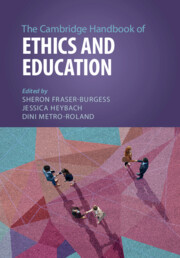Book contents
- The Cambridge Handbook of Ethics and Education
- The Cambridge Handbook of Ethics and Education
- Copyright page
- Epigraph
- Contents
- Figures
- Tables
- Contributors
- Foreword
- Preface
- Acknowledgments
- Part I Traditions in Ethics and Education
- Part II Ethics and Education in Practice
- Part III Emerging Ethical Pathways and Frameworks
- 28 Defining Moral Responsibility for School Leaders in Times of Democratic Crisis
- 29 Convivialism, Interdependence, and Education
- 30 New Existentialism
- 31 Antiracist Moral and Civic Education
- 32 A Decolonial Feminist Perspective
- 33 Ethics and Mindful Leadership in Education
- 34 Ethics as a Field Discipline in the Classroom
- 35 Centering an Environmental Ethic in Climate Crisis
- 36 Ethical Inquiry in Educational Research
- 37 Education and the Technological Horizon
- 38 Teaching in Credal Deep Pluralism
- 39 A Pragmatic Approach to Ethics in Education
- 40 Spectatorship, Black Bodies, and Urban Education
- Index
- References
39 - A Pragmatic Approach to Ethics in Education
from Part III - Emerging Ethical Pathways and Frameworks
Published online by Cambridge University Press: 07 March 2024
- The Cambridge Handbook of Ethics and Education
- The Cambridge Handbook of Ethics and Education
- Copyright page
- Epigraph
- Contents
- Figures
- Tables
- Contributors
- Foreword
- Preface
- Acknowledgments
- Part I Traditions in Ethics and Education
- Part II Ethics and Education in Practice
- Part III Emerging Ethical Pathways and Frameworks
- 28 Defining Moral Responsibility for School Leaders in Times of Democratic Crisis
- 29 Convivialism, Interdependence, and Education
- 30 New Existentialism
- 31 Antiracist Moral and Civic Education
- 32 A Decolonial Feminist Perspective
- 33 Ethics and Mindful Leadership in Education
- 34 Ethics as a Field Discipline in the Classroom
- 35 Centering an Environmental Ethic in Climate Crisis
- 36 Ethical Inquiry in Educational Research
- 37 Education and the Technological Horizon
- 38 Teaching in Credal Deep Pluralism
- 39 A Pragmatic Approach to Ethics in Education
- 40 Spectatorship, Black Bodies, and Urban Education
- Index
- References
Summary
This chapter explores the intersection of normative theory, pragmatism, and education. Philosophers have long argued that ethics and moral development are the central aims of good education. But this vision has been eclipsed by economic instrumentalism and workforce demands. Ethics education provides a potent reason-based alternative, one that promises to promote pluralism through the application of universal principles, foster democratic processes, and advance the common good. But if we hope to realize the moral purposes of education, we must begin by offering courses in normative ethics for educators in education programs and schools. And in doing so, we will promote the moral growth of individual educators, their students, and the institutions and communities in which they live, work, and study.
- Type
- Chapter
- Information
- The Cambridge Handbook of Ethics and Education , pp. 821 - 845Publisher: Cambridge University PressPrint publication year: 2024

